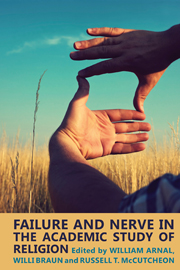Book contents
- Frontmatter
- Content
- Preface
- Acknowledgments
- Contributors
- Epigraph
- The Nerve of Donald Wiebe
- The Failure of Nerve in the Academic Study of Religion
- General Failures
- Special Failures
- Failures (of Nerve?) in the Study of Islamic Origins
- The Failure of Islamic Studies Post-9/11: A Contextualization and Analysis
- Religious Studies that Really Schmecks: Introducing Food to the Academic Study of Religion
- Cultural Anthropology and Corinthian Food Fights: Structure and History in the Lord's Dinner
- The Identity of Q in the First Century: Reproducing a Theological Narrative
- The Failure of Nerve to Recognize Violence in Early Christianity: The Case of the Parable of the Assassin
- Redescribing Iconoclasm: Holey Frescoes and Identity Formation
- In Lieu of Conclusion
- Index of Authors
Cultural Anthropology and Corinthian Food Fights: Structure and History in the Lord's Dinner
from Special Failures
- Frontmatter
- Content
- Preface
- Acknowledgments
- Contributors
- Epigraph
- The Nerve of Donald Wiebe
- The Failure of Nerve in the Academic Study of Religion
- General Failures
- Special Failures
- Failures (of Nerve?) in the Study of Islamic Origins
- The Failure of Islamic Studies Post-9/11: A Contextualization and Analysis
- Religious Studies that Really Schmecks: Introducing Food to the Academic Study of Religion
- Cultural Anthropology and Corinthian Food Fights: Structure and History in the Lord's Dinner
- The Identity of Q in the First Century: Reproducing a Theological Narrative
- The Failure of Nerve to Recognize Violence in Early Christianity: The Case of the Parable of the Assassin
- Redescribing Iconoclasm: Holey Frescoes and Identity Formation
- In Lieu of Conclusion
- Index of Authors
Summary
In all societies, both simple and complex, eating is the primary way of initiating and maintaining human relationships… Once the anthropologist finds out where, when, and with whom the food is eaten, just about everything else can be inferred about the relations among the society's members… To know what, where, how, when and with whom people eat is to know the character of their society.
(Farb and Armelagos 1980: 4)As we have known at least since Shklovsky, the task of “defamiliarization”— to make familiar what, at first glance, appears strange to us, and to make strange what we first thought familiar—is essential to the study of any human social formation (Shklovsky 1965; cited in Smith 2004a: 484). In the field of Christian Origins—the branch of the academy charged with the study of early Christian writings, and a field that, as Jonathan Z. Smith has pointed out, has remained overwhelmingly an affair of native exegesis—defamiliarization is especially imperative, since it is sometimes easy to forget that our data are unfamiliar. Though, in anthropological terms, a text like 1 Corinthians should appear no more familiar to the scholar than any ethnography of a nineteenth-century Fijian village, we scholars of Christian origins often allow the “self-evidence” of the Corinthian Christ group to stand unquestioned. We often assume we know why this association was formed, why it continued to meet, and what kind of problems it was experiencing. Upon reflection, however, this self-evidence cannot be allowed to stand.
- Type
- Chapter
- Information
- Failure and Nerve in the Academic Study of Religion , pp. 157 - 176Publisher: Acumen PublishingPrint publication year: 2012



